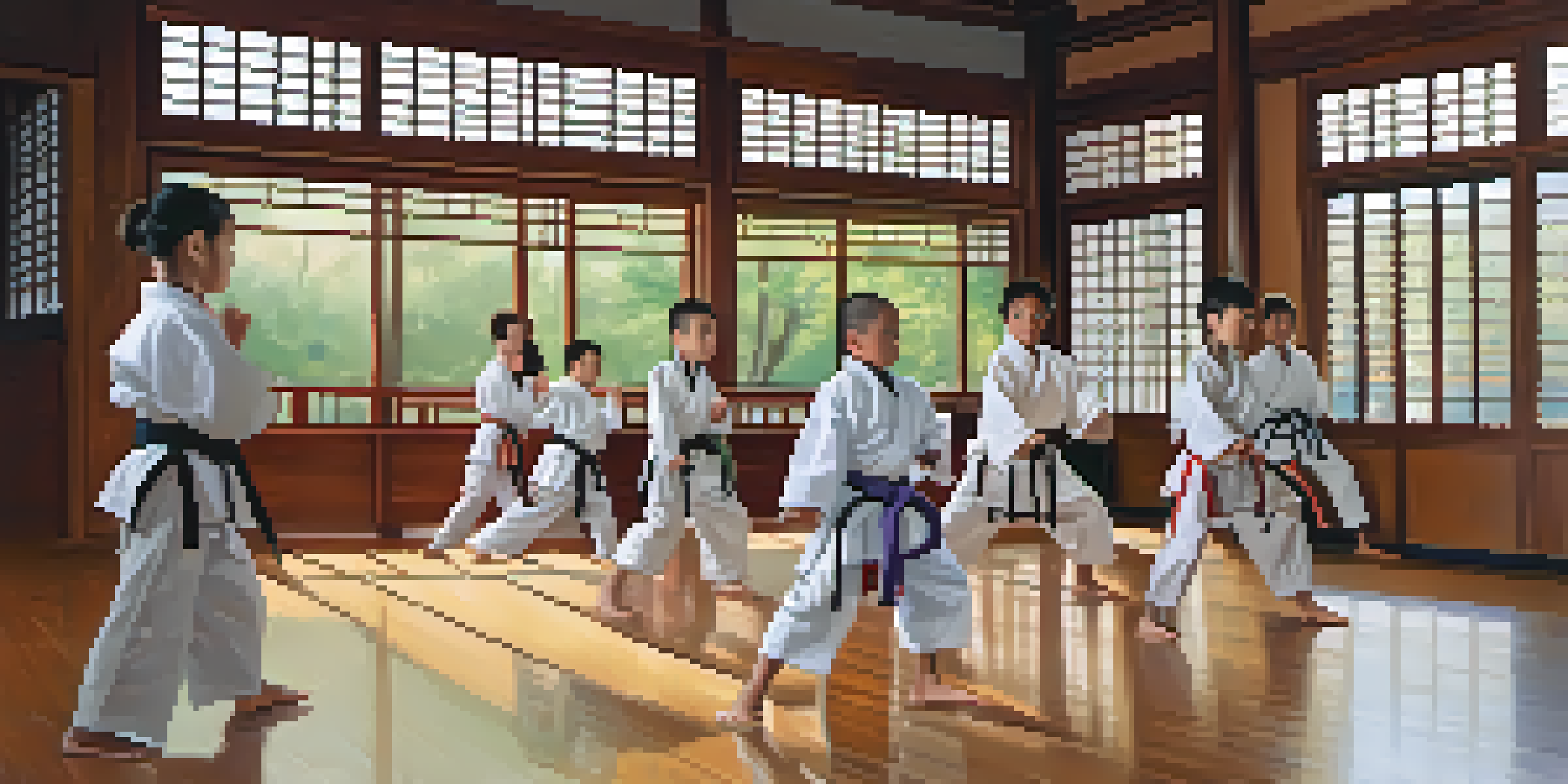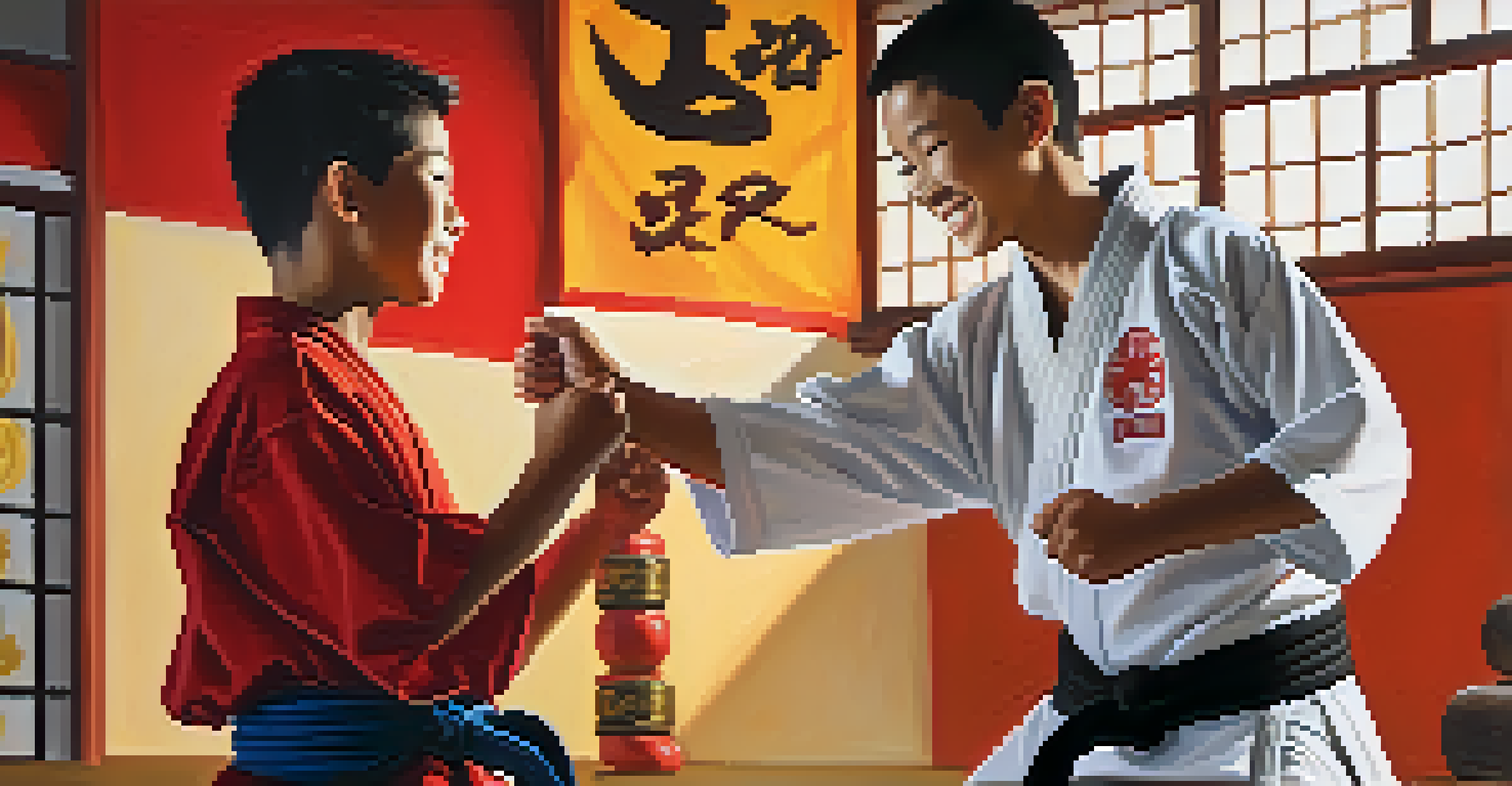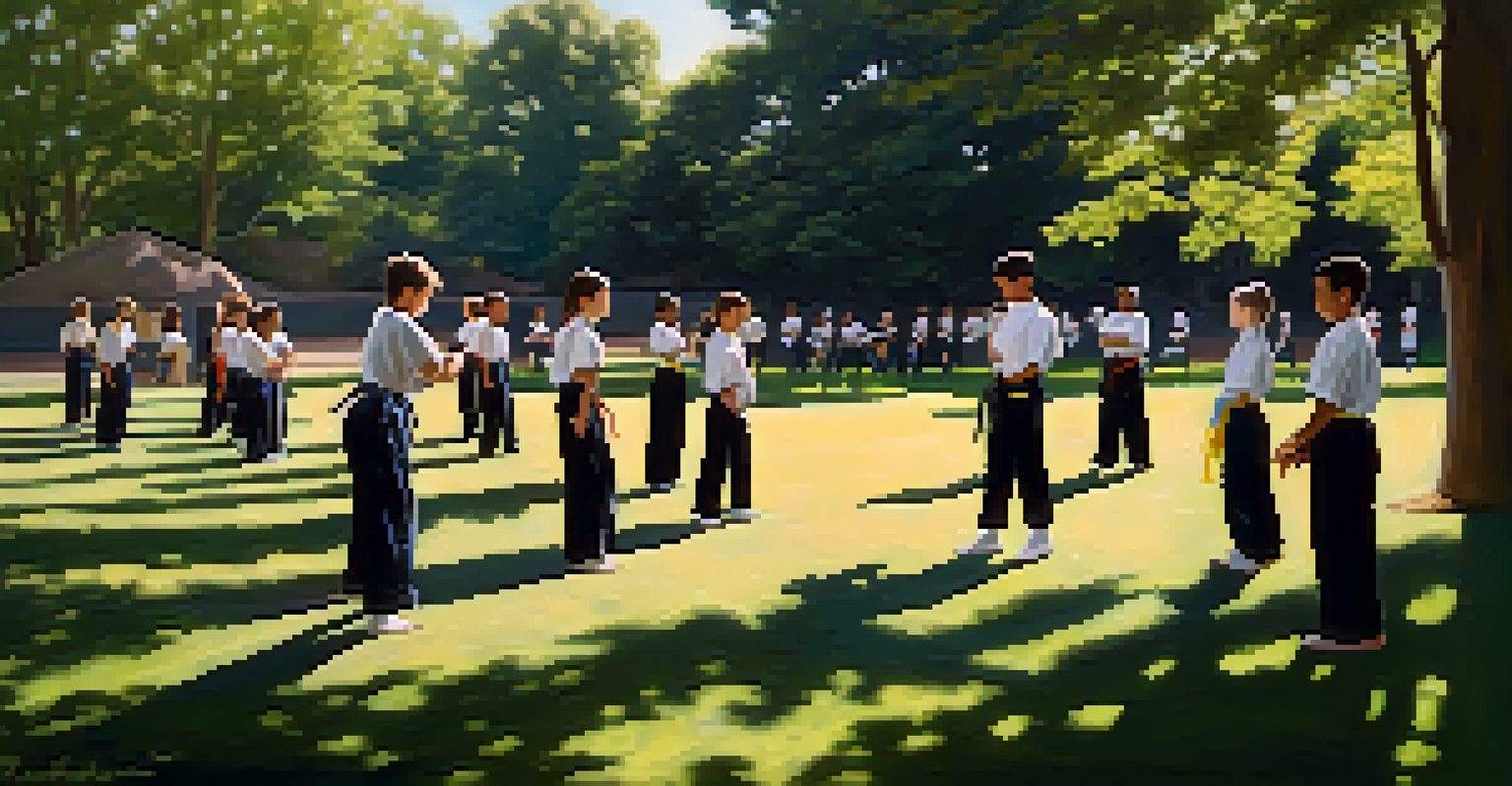Mentorship in Martial Arts: Guiding At-Risk Youth to Success

Understanding the Role of Mentorship in Martial Arts
Mentorship in martial arts is about more than just teaching techniques; it's about fostering personal growth. In a dojo, a mentor guides students through physical challenges while also instilling values like respect, discipline, and perseverance. This holistic approach can particularly benefit at-risk youth, who may lack positive role models in their lives.
A mentor is someone who allows you to see the hope inside yourself.
When a mentor invests time in understanding their students, they can tailor their guidance to meet individual needs. This personal connection not only builds trust but also encourages students to push their boundaries, both physically and mentally. For at-risk youth, this tailored support can be a game changer, helping them feel valued and understood.
Moreover, the mentor-student relationship often extends beyond the dojo. As mentors become trusted figures, they can provide advice on life challenges, academic pressures, and social dynamics. This comprehensive support system is vital for at-risk youth, who may be navigating complex environments outside martial arts.
The Impact of Discipline and Accountability
One of the core tenets of martial arts is discipline, which plays a crucial role in mentorship. Young practitioners learn the importance of regular training, punctuality, and respect for others. This sense of discipline can translate into other areas of their lives, fostering a strong work ethic and accountability in school and home settings.

For at-risk youth, establishing a routine through martial arts can be particularly beneficial. It provides structure and a sense of purpose, helping them to channel their energy into something positive. Over time, this disciplined practice builds confidence, empowering them to tackle challenges head-on.
Mentorship Fuels Personal Growth
In martial arts, mentors foster personal development by instilling values like respect and discipline while providing tailored guidance for at-risk youth.
Additionally, mentors emphasize the importance of setting goals—whether it's achieving a new belt rank or mastering a difficult technique. This goal-oriented mindset encourages students to strive for success, reinforcing the idea that their efforts can lead to tangible results. For youth facing uncertainties, this message is incredibly motivating.
Building Confidence Through Achievement
Martial arts training is filled with milestones, from earning new belts to mastering complex moves. Each achievement, no matter how small, boosts a student's confidence and instills a sense of accomplishment. For at-risk youth, these victories can be particularly significant, often contrasting with their experiences in other areas of life.
The greatest gift of leadership is a boss who wants you to be successful.
Mentors play a crucial role in celebrating these achievements, reinforcing the idea that hard work pays off. They provide positive reinforcement, which is essential for youth who may struggle with self-esteem. This continuous support encourages students to take on new challenges, knowing they have someone cheering them on.
As confidence builds, so does the willingness to tackle life's hurdles. The skills learned in the dojo—perseverance, focus, and resilience—become tools that students can use outside of martial arts. This transformation empowers at-risk youth to pursue their goals and aspirations with newfound determination.
Fostering Emotional Resilience in Youth
Martial arts training often involves facing fears and overcoming obstacles, both physical and emotional. Mentors guide students through these challenges, teaching them to manage stress and anxiety effectively. For at-risk youth, learning to cope with emotions in a constructive way is a vital skill that can lead to healthier relationships and life choices.
Through sparring and drills, students confront their fears head-on, learning that failure is a part of growth. Mentors encourage them to view setbacks as opportunities for learning rather than as insurmountable barriers. This shift in mindset fosters emotional resilience, enabling youth to bounce back from difficulties they encounter outside the dojo.
Discipline Builds Life Skills
The discipline learned through martial arts training translates into improved work ethic and accountability, helping youth tackle challenges in various aspects of life.
Moreover, mentors create a safe space for open discussions about feelings and experiences. By promoting emotional intelligence, they empower students to express themselves and seek help when needed. This holistic approach to mentorship not only enhances martial arts skills but also nurtures well-rounded individuals.
Community Building and Positive Relationships
In martial arts, the sense of community is palpable. Dojos serve as safe havens where at-risk youth can connect with peers and mentors who share their interests. These relationships often extend beyond training sessions, fostering friendships that provide support and encouragement.
Mentorship within this community setting encourages collaboration and teamwork. Youth learn the importance of supporting one another, creating a culture of camaraderie. For at-risk individuals, this network can be a lifeline, offering a sense of belonging that is often missing in their lives.
Additionally, mentors often involve students in community outreach, reinforcing the idea that they can make a positive impact. Whether it's volunteering or participating in local events, these experiences help youth develop a sense of responsibility and purpose. This connection to community is invaluable in shaping their identities and futures.
Life Skills Beyond the Dojo
The lessons learned in martial arts go far beyond physical techniques; they encompass essential life skills. Mentorship helps students develop critical thinking, problem-solving, and decision-making abilities. These skills are transferable, equipping at-risk youth to navigate challenges in their academic and personal lives.
For example, learning to strategize during sparring translates into improved decision-making in real-life situations. Mentors guide students in applying the principles of martial arts, such as patience and adaptability, to everyday challenges. This practical application reinforces the idea that skills gained in the dojo can empower youth in various contexts.
Community Fosters Positive Change
The dojo serves as a supportive community where at-risk youth build relationships and develop a sense of belonging, ultimately leading to transformative life changes.
Moreover, the emphasis on respect and integrity instilled by mentors shapes students' character. By understanding the importance of ethical behavior, at-risk youth learn to make better choices and cultivate positive relationships. These foundational skills pave the way for a more successful and fulfilling life.
Transforming Futures: Success Stories from the Dojo
Many individuals have experienced profound transformations through martial arts mentorship. Success stories abound, showcasing how at-risk youth have overcome obstacles to achieve their dreams. These inspiring narratives highlight the potential of mentorship to change lives for the better.
For instance, a young person facing academic struggles may find focus and determination through martial arts training. With the guidance of a mentor, they may improve their grades and even pursue higher education. Such stories illustrate the ripple effect of mentorship, as success in one area often leads to achievements in others.

These transformations not only benefit individuals but also uplift entire communities. As at-risk youth grow into confident, responsible adults, they become role models for their peers and younger generations. This cycle of mentorship and growth creates a legacy of success that extends far beyond the dojo.